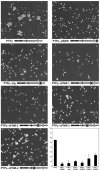Cancer-derived mutations in the fibronectin III repeats of PTPRT/PTPrho inhibit cell-cell aggregation
- PMID: 20230342
- PMCID: PMC2921943
- DOI: 10.3109/15419061003653771
Cancer-derived mutations in the fibronectin III repeats of PTPRT/PTPrho inhibit cell-cell aggregation
Abstract
Abstract The receptor protein tyrosine phosphatase T PTPrho is the most frequently mutated tyrosine phosphatase in human cancer. PTPrho mediates homophilic cell-cell aggregation. In its extracellular region, PTPrho has cell adhesion molecule-like motifs, including a MAM domain, an immunoglobulin domain, and four fibronectin type III (FNIII) repeats. Tumor-derived mutations have been identified in all of these extracellular domains. Previously, the authors determined that tumor-derived mutations in the MAM and immunoglobulin domains of PTPrho reduce homophilic cell-cell aggregation. In this paper, the authors describe experiments in which the contribution of the FNIII repeats to PTPrho-mediated cell-cell adhesion was evaluated. The results demonstrate that deletion of the FNIII repeats of PTPrho result in defective cell-cell aggregation. Furthermore, all of the tumor-derived mutations in the FNIII repeats of PTPrho also disrupt cell-cell aggregation. These results further support the hypothesis that mutational inactivation of PTPrho may lead to cancer progression by disrupting cell-cell adhesion.
Figures





References
-
- Aricescu AR, Siebold C, Choudhuri K, Chang VT, Lu W, Davis SJ, van der Merwe PA, Jones EY. Structure of a tyrosine phosphatase adhesive interaction reveals a spacer-clamp mechanism. Science. 2007;317:1217–20. - PubMed
-
- Aricescu AR, Siebold C, Jones EY. Receptor protein tyrosine phosphatase mu: measuring where to stick. Biochem Soc Trans. 2008;36:167–72. - PubMed
Publication types
MeSH terms
Substances
Grants and funding
LinkOut - more resources
Full Text Sources
Other Literature Sources
